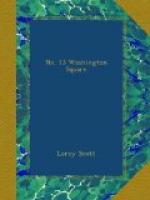The shaft of sarcasm quivered into the center of Judge Harvey’s sorest spot. Those recently discovered letters of Thomas Jefferson which Judge Harvey had presented to the Historical Society, and which had been so widely discussed as throwing new light upon the beginnings of the United States Republic, had a month before been pronounced and proved to be clever but arrant forgeries. The newspaper sensation and the praise that had attended the discovery and gift—warming and exalting Judge Harvey’s very human pride—had been followed by an anti-climax of gibes and jeers at his gullibility. Whenever the hoax was spoken of, Judge Harvey writhed with personal humiliation, and with anger against the person who had recalled his discomfiture, and with a desire for vengeance against the perpetrator of the swindle.
“Remember this, that the first experts pronounced those letters genuine,” he retorted in a hot, trembling voice. “And I’m going to get that scoundrel—you see! Only to-day I had word from the Police Commissioner that his department at last had clues to that fellow Preston. And, besides,” he ended cuttingly, “though I was deceived, I at least made an effort to spend my money upon a worthy object.”
They glared into one another’s eyes; old friends now thoroughly aroused against each other. They might be sarcastic or out-spoken; but their self-respect, their good-breeding, would not permit them to become vituperative, to lose themselves in outbursts of wrath—though such might have been the healthier course. They knew how to plug the volcano. So for a space, though they quivered, they were silent.
Mrs. De Peyster it was who first spoke. Her voice had recovered its most formal, frigid tone.
“Please recall, Judge Harvey, that you are here at the present moment not as a friend but as my man of affairs.”
“All right,” he said grimly. “But at least I’ve told you what I thought as a friend.”
“As my man of affairs,” she continued with her magnificent iciness, “you may now tell me what you have been able to do for me about a cottage in Newport.”
“Very well, here goes as your man of affairs: You said you wished to be in Newport from the middle of July to early in September.”
“Yes.”
“The house, of those available, which I thought would come nearest suiting you is ‘The Heron’s Nest.’”
“You mean the cottage Mrs. Van der Grift had last season?”
“The same.”
“You need not describe it then. I know it perfectly. It is exactly what I desire; elegant, but not showy. And the terms?”
“Ten thousand for the season.”
“Quite satisfactory. I hope you have taken a lease.”
“I have an option till to-morrow.”
“Then close it. I suppose you have brought my letters of credit?”
“That,” said he in formal lawyer tone, “brings me back to the news which, as your man of affairs, I was trying to break to you when you thought, as a friend, I was trying to propose.”




